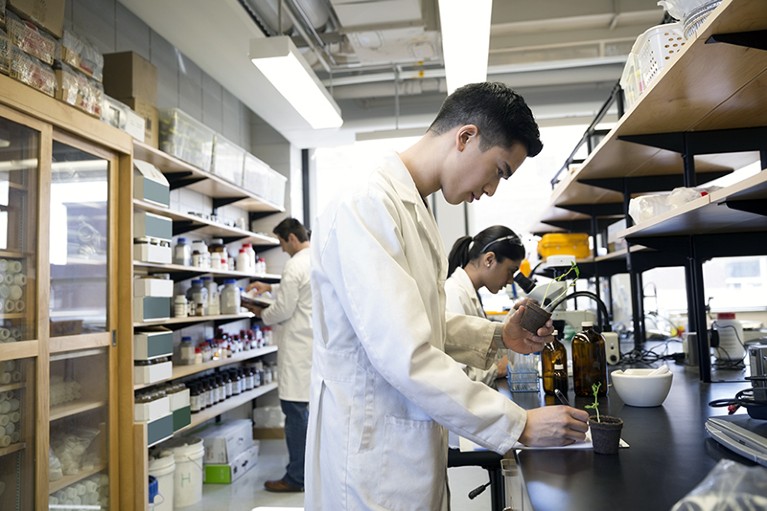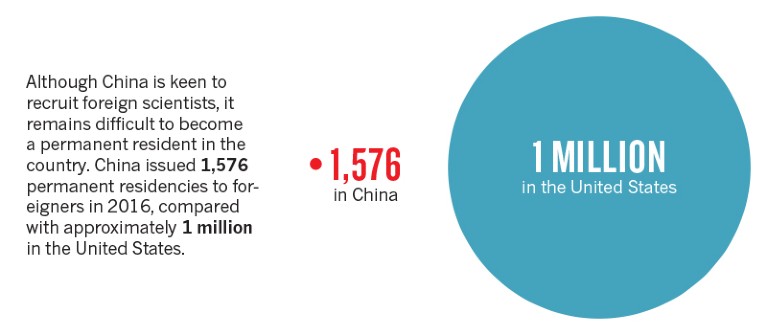
The Thousand Talents Plan is one approach through which China hopes to achieve its scientific ambitions.Credit: Hero Images/Getty
In 2008, China’s central government announced the Thousand Talents Plan: a scheme to bring leading Chinese scientists, academics and entrepreneurs living abroad back to China. In 2011, the scheme grew to encompass younger talent and foreign scientists, and a decade later, the Thousand Talents Plan has attracted more than 7,000 people overall. For Chinese scientists, the scheme has given them a strong financial incentive to return home. For foreigners, it’s an opportunity to join the Chinese system with major administrative hurdles removed.
How does it work?
Previous programmes to lure back ex-pat scientists elevated postdocs and junior faculty members to full professorial or equivalent positions in China, but the Thousand Talents Plan was more ambitious, aiming to target professors and chief scientists in the West. This approach led to tougher recruitment criteria across all schemes, and high-level positions became less easy to come by. It’s well understood in the research community that scientists recruited through talent schemes will gain access to much higher salaries and research funding levels than their locally trained peers.
Where do I begin?
To apply for any of the Thousand Talents schemes, you must already have a firm job offer from a Chinese institution. If you are a full professor at a leading Western university, you will more than likely be eligible for a place on the Thousand Talents scheme for senior academics, as long as your research record meets the demands of your field of study in China. The scheme is open to Chinese scientists under 55 years of age, and foreigners younger than 65. All applicants must have worked at renowned universities outside China, and have a strong publication record.
When you’ve confirmed a position with a Chinese institution, your university will probably suggest that you apply for the Thousand Talents programme, and ask for your CV with a list of published papers, copies of all academic qualifications (original or certified) and full-text copies of your highest impact research papers. Usually, letters of reference are not required. The university will then apply on your behalf. The length of the application process (which includes an interview) can be a matter of months if the applicant meets all of the criteria first time around. However, after signing their employment contract and agreeing to the terms of the Thousand Talents Plan, such as a minimum three to five years of working in China, scientists may need to wait for all aspects of their agreed research project to be realized, as not every financial and administrative decision is controlled directly by the university.
What are the benefits?
All successful applicants can expect a 1 million yuan (US$151,000) starting bonus, and the opportunity to apply for a research fund of 3–5 million yuan. Foreign scientists receive additional incentives, such as accommodation subsidies, meal allowances, relocation compensation, paid-for visits home and subsidized education costs. Employers are also obliged to find jobs for foreign spouses, or provide an equivalent local salary. In addition, the Thousand Youth Talents Plan targets foreign and ex-pat Chinese scientists under the age of 40 — unlike the main Thousand Talents Plan, Chinese returnees receive the same benefits as foreign recruits under the Thousand Youth Talents Plan. More details for all programmes can be found on the official website, 1000plan.org/en/.
Whether you were born in China or come from abroad, all applications to the Thousand Talents scheme go through your Chinese university employer. Only one institution can apply on your behalf, so you cannot make multiple applications.

Sources: Center for China and Globalization/Pew Research Center
What makes for a successful Thousand Talents application?
Your publication record, career record and communication skills are all important. Chinese institutions pay the greatest attention to the number of high-impact papers published. They also prefer scientists who have graduated from leading universities. Finally, make sure you establish the value you can add to your chosen research institution in China, highlighting your research ideas and particular areas of expertise.
A common mistake is to focus on one’s own research without thinking about the department or school’s research conditions and directions. Another is to stress the significance of your work, rather than how it could attract funding or when it could be published. In China, it is expected that newly employed scientists will be productive as quickly as possible. Creativity and originality are not valued as highly as publication rate.


 How to find a job in China
How to find a job in China
 The ups and downs of moving to China
The ups and downs of moving to China





